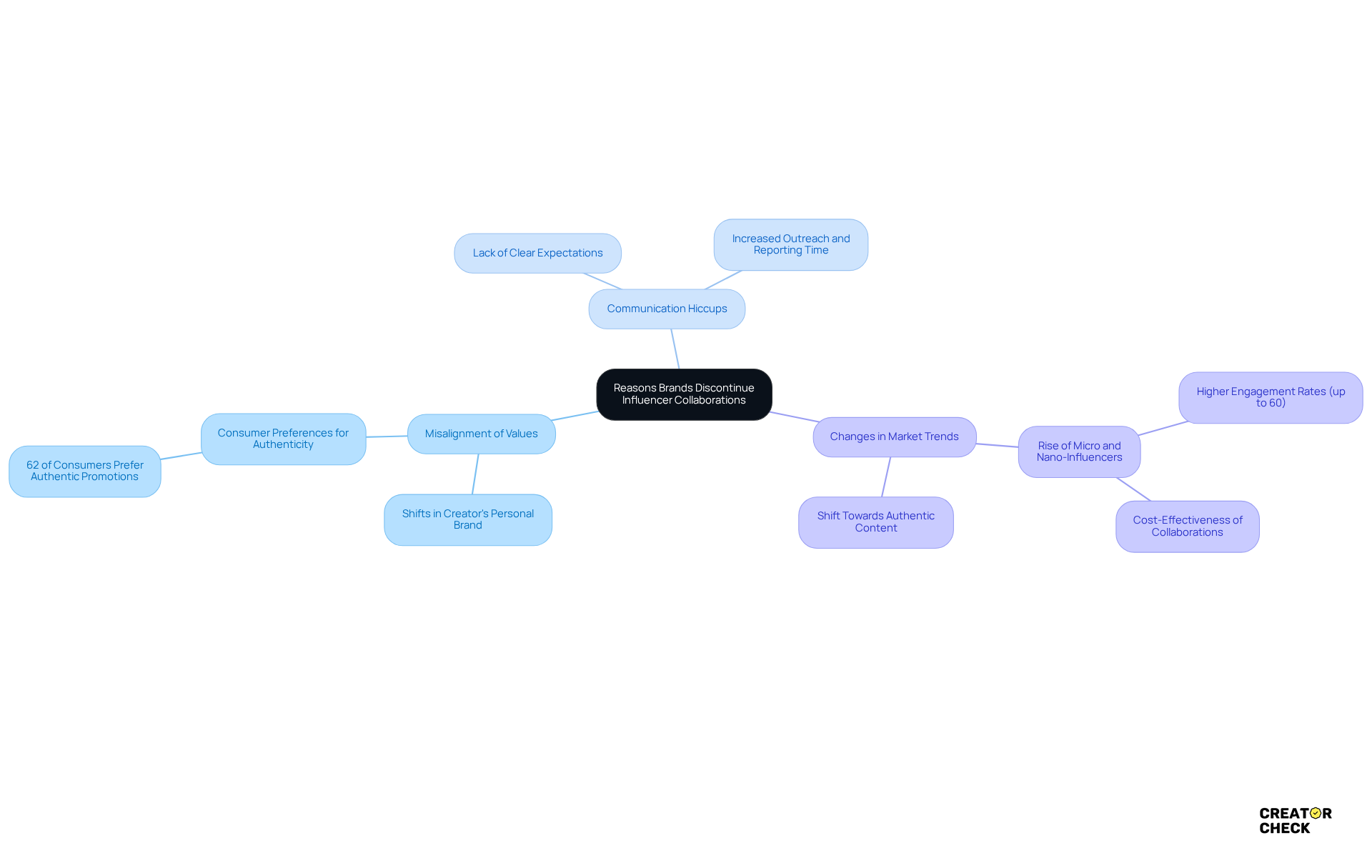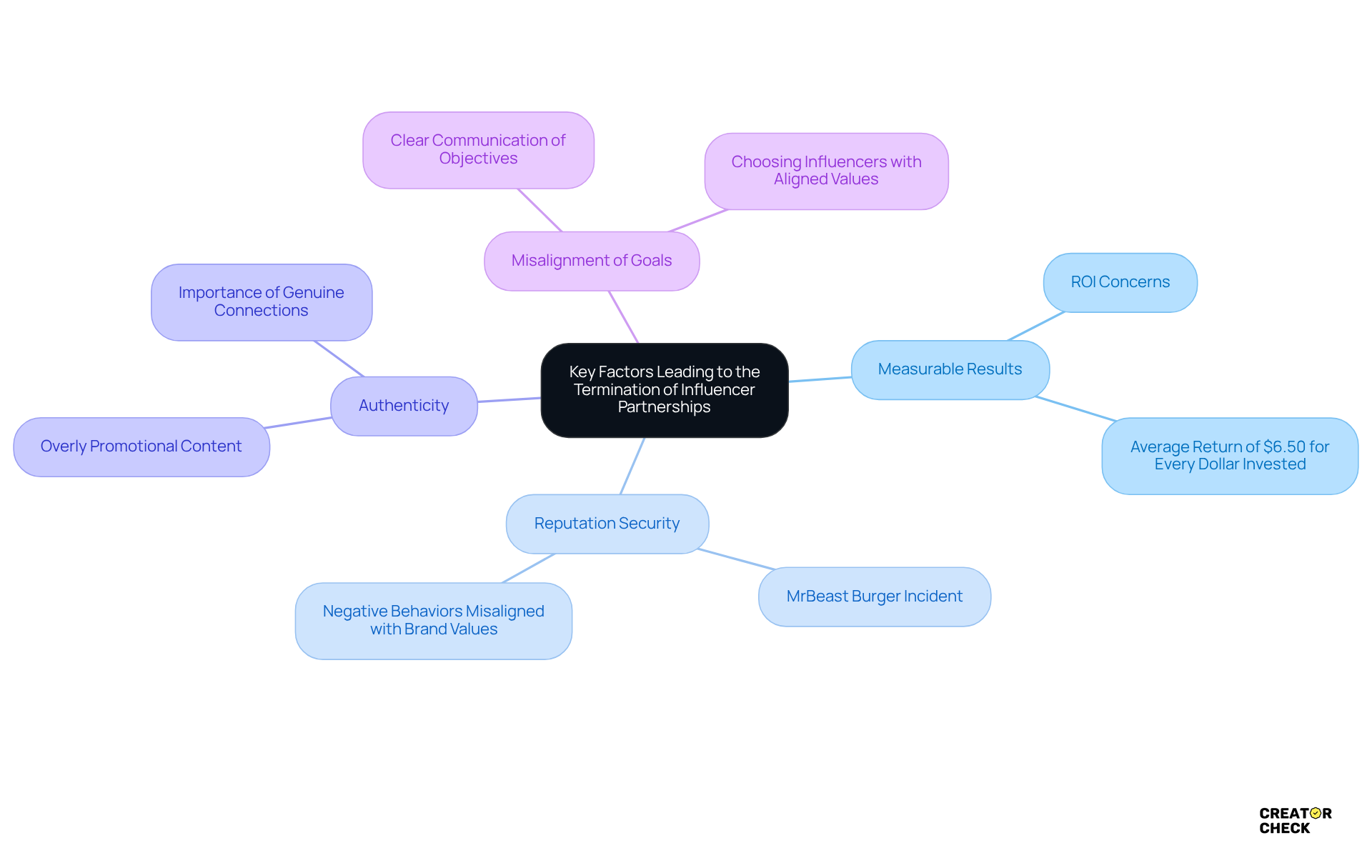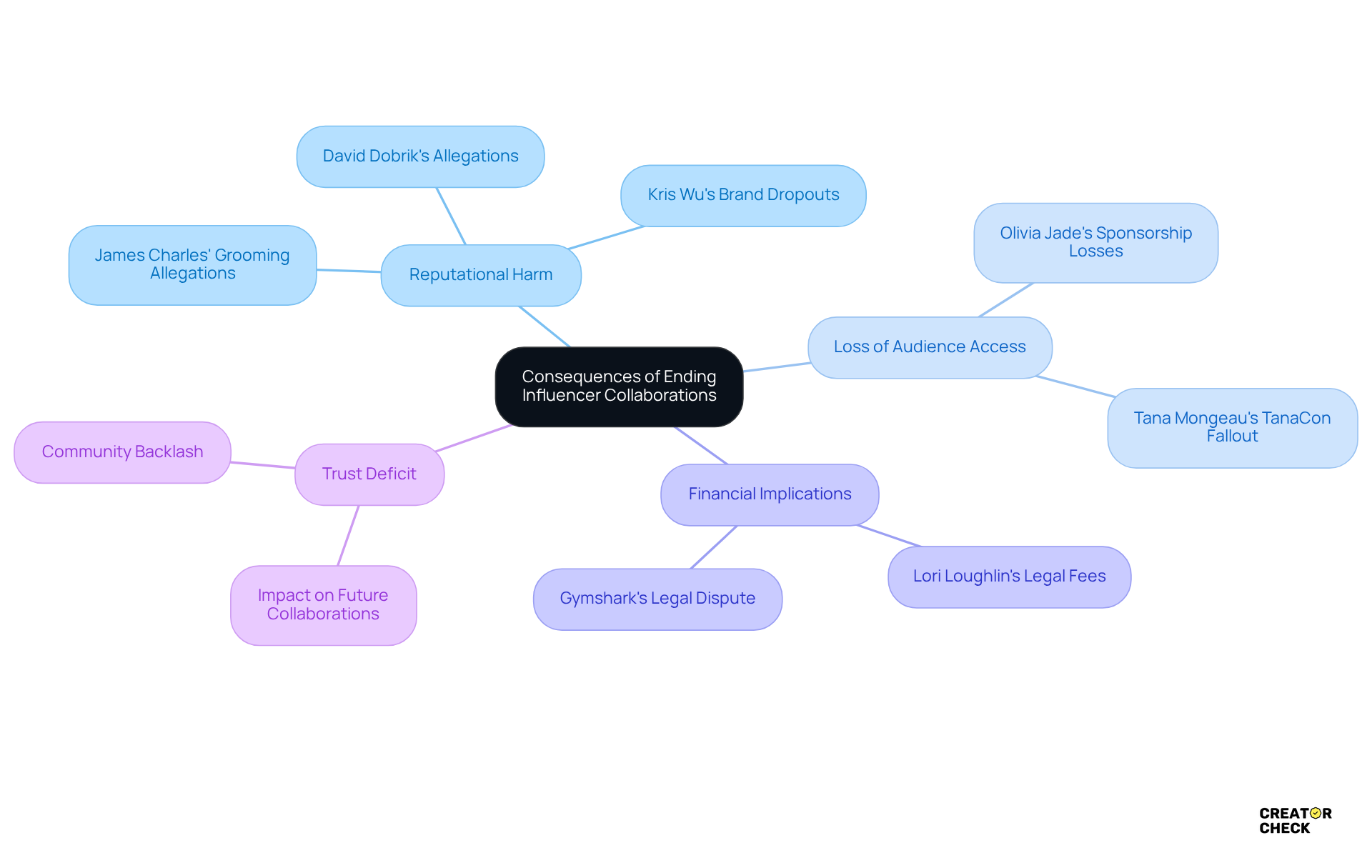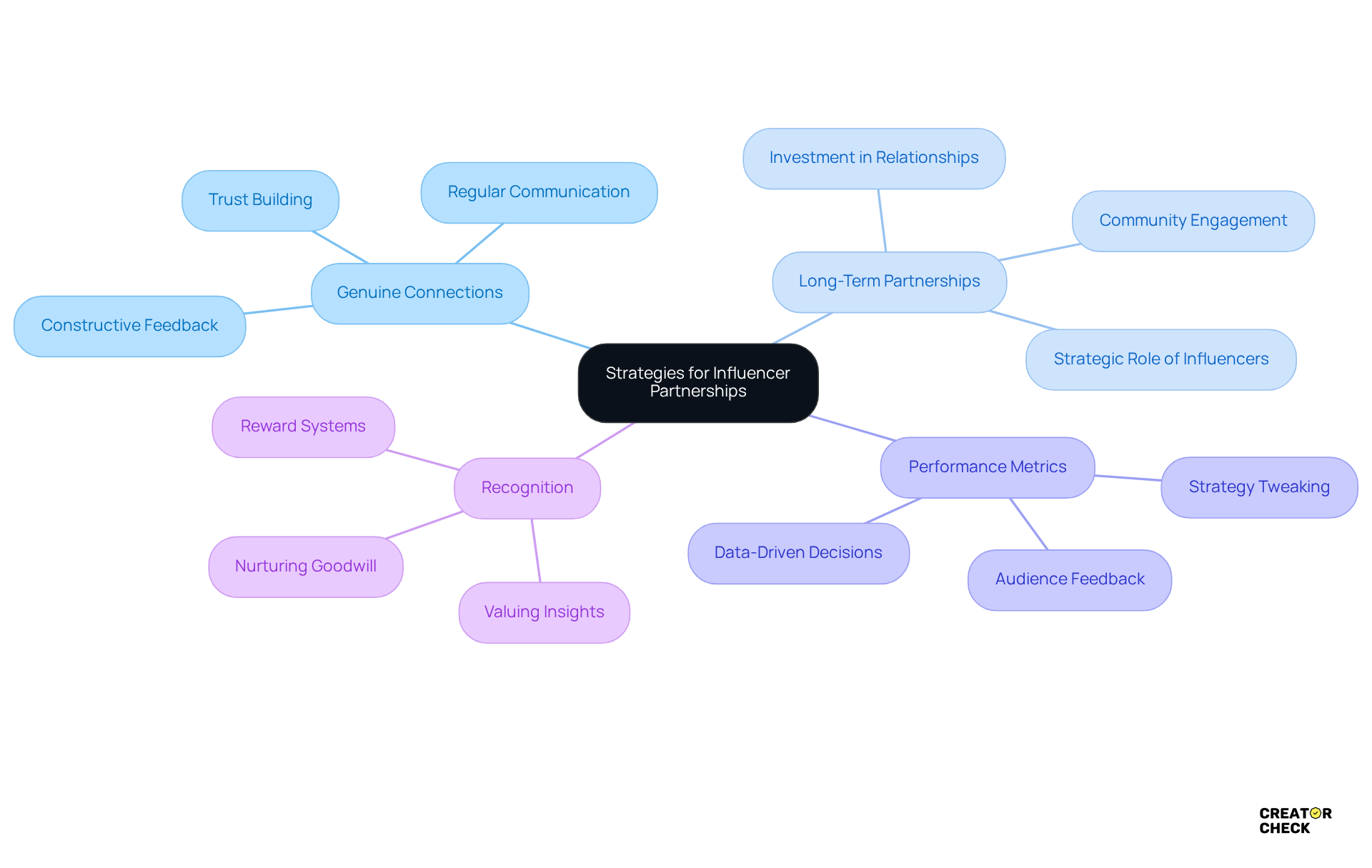Overview
Brands often find themselves parting ways with influencers, and it usually boils down to a few key reasons:
- Misaligned values
- Communication hiccups
- Ever-changing market trends that can really shake up collaborations
It’s interesting to note that things like:
- A lack of measurable results
- The reputational risks that come with controversies
- The need for authentic connections
play a huge role in these decisions. So, what does this mean for you? It emphasizes that for partnerships to truly succeed, alignment and trust are absolutely essential. Remember, it’s all about building those genuine connections!
Introduction
The world of influencer marketing is always changing, and that means brands need to take a fresh look at their partnerships with social media stars. As what consumers want shifts and the call for authenticity grows louder, companies have to figure out the tricky reasons why some collaborations come to an end.
So, what makes brands decide to part ways with influencers? Whether it’s a clash of values or the hunt for solid results, knowing these reasons is key for brands that want to keep their partnerships thriving.
As influencer marketing keeps expanding, the big question remains: how can brands build connections that not only resonate with their audience but also stand the test of time?
Understanding the Reasons Brands Discontinue Influencer Collaborations
There are a few key reasons that explain why brands stop working with influencers. Think about why brands stop working with influencers, including:
- Misalignment of values
- Communication hiccups
- Changes in market trends
For example, a company might discover why brands stop working with influencers, as a content creator's posts may no longer resonate with their target audience or the creator's personal brand may have shifted in a way that doesn’t align with the company’s image. As consumer preferences shift, companies are on the lookout for collaborations with individuals who embody current trends—especially those that showcase authenticity and transparency. Did you know that 62% of consumers are more likely to buy products when promotions align with a creator's usual content?
Now, let’s talk about micro and nano-influencers. These folks, known for their highly engaged audiences, are prompting companies to rethink their relationships with bigger influencers who might not provide the same level of interaction. In fact, micro-influencers can spark engagement rates that are up to 60% higher than their larger counterparts! Plus, working with ten micro-influencers often costs less than hiring one big name. This shift really emphasizes the need for companies to tweak their marketing strategies with ambassadors to understand why brands stop working with influencers, ensuring they stay in sync with their values and audience expectations.
Moreover, companies are increasingly focused on building genuine connections with key figures to avoid the reasons why brands stop working with influencers, rather than just engaging in transactional relationships. Understanding these dynamics is crucial for companies looking to navigate the social media landscape effectively and make informed decisions about their marketing strategies. By fostering authentic relationships with influencers who share their ethos, companies can enhance their marketing effectiveness and drive better results. So, what does this mean for you? It’s all about creating those meaningful connections that can truly elevate your brand!

Key Factors Leading to the Termination of Influencer Partnerships
Several important elements contribute to understanding why brands stop working with influencers. One major concern? The lack of measurable results. Companies are increasingly focused on return on investment (ROI), and if a collaboration doesn’t deliver tangible outcomes, this could be a reason why brands stop working with influencers. Did you know that companies see an average return of $6.50 for every dollar invested in marketing through key individuals? This really highlights the importance of effective collaborations.
Now, let’s talk about reputation security. Controversies or scandals involving an influencer can illustrate why brands stop working with influencers. Take the MrBeast Burger incident, for example. It shows how negative behaviors that clash with company values can have serious repercussions. Brands are really prioritizing authenticity these days. If an influencer’s content feels overly promotional or inauthentic, it can hurt the brand’s reputation, which is one of the reasons why brands stop working with influencers.
Misalignment in campaign goals and expectations is a key factor in understanding why brands stop working with influencers, adding another layer of complexity to collaborations. Clear communication of objectives is essential. Brands need to choose influencers whose values align with their own to create successful partnerships. Otherwise, misalignment can cause friction and dissatisfaction on both sides.
As the marketing landscape evolves—forecasts suggest it will reach $85 billion by 2028—understanding these dynamics is crucial for maintaining beneficial collaborations. So, what does this mean for you? It’s all about fostering those connections that truly resonate!

Consequences of Ending Influencer Collaborations for Brands
Terminating influencer partnerships can illustrate why brands stop working with influencers. First off, there's the risk of reputational harm. If a company suddenly ends a partnership, it might come off as unprofessional or inconsiderate, raising concerns about why brands stop working with influencers, which could make future influencers think twice about collaborating. Just look at the fallout from major scandals like David Dobrik's allegations—it's a clear example of how quickly reputational damage can escalate, leading to long-lasting effects for the companies involved.
Plus, companies might find themselves losing access to the influencer's audience, which is one of the reasons why brands stop working with influencers, as it can hurt their visibility and engagement. This is particularly crucial when the social media personality has built a loyal following that aligns with the company's target market. And let’s not forget about the financial implications; companies often invest significant resources into campaigns, which makes one wonder why brands stop working with influencers if the collaboration falls apart. Take the college admissions scandal with Lori Loughlin, for instance—her daughter Olivia Jade faced the loss of major sponsorships, which really highlights the financial risks tied to reputational damage.
Finally, a trust deficit within the promoter community can result from ending these partnerships, which explains why brands stop working with influencers, making it trickier for companies to forge new collaborations down the line. As one marketing pro put it, 'When issues surface, social media communities will connect the dots fast. Brands must be ready to respond just as quickly.' This really underscores how important it is to maintain a positive reputation and manage these relationships thoughtfully to avoid any harm to your standing in the social media landscape. So, what does this mean for you? It’s all about keeping those connections strong and ensuring you’re navigating this space with care!

Strategies for Brands to Sustain Successful Influencer Partnerships
To keep collaborations thriving, companies really need to focus on building genuine connections with their collaborators. It all starts with regular communication, which helps build trust—did you know that 81% of consumers say trust is a key factor in their purchasing decisions? This ensures that everyone is on the same page regarding campaign goals and expectations right from the get-go. Plus, offering constructive feedback and involving key players in the creative process not only boosts the quality of the collaboration but also allows them to play a significant role in shaping the company’s vision.
Now, investing in long-term partnerships instead of just one-off collaborations is super important for fostering deeper engagement and loyalty from the influencer's audience. Brands that tweak their strategies based on performance metrics and audience feedback show they’re committed to evolving alongside their partners, which can really amp up the effectiveness of their campaigns. Take the Lancôme campaign featuring Emelie Tommerberg, for example. It demonstrates how bringing key figures into traditional advertising can strengthen connections with the company.
And let’s not forget—recognizing and fairly rewarding key individuals for their contributions is crucial for nurturing goodwill and encouraging ongoing collaboration. By treating social media personalities as strategic partners and valuing their insights, brands can build a more sustainable and productive marketing ecosystem. In fact, over 80% of marketers believe influencer marketing is a vital part of their overall strategy, underscoring the significance of these partnerships in the wider marketing landscape.

Conclusion
Understanding why brands choose to end their collaborations with influencers is super important for navigating the ever-changing world of influencer marketing. The key takeaway here is that aligning values, keeping communication clear, and adapting to market trends are essential for building successful partnerships. As brands look for authenticity and engagement, it’s crucial to approach influencer collaborations with care and a bit of strategic thinking.
So, what’s really at play? Misalignment in values, poor communication, and the drive for measurable results can heavily influence a brand's decision to part ways with influencers. Plus, let’s not forget about the rise of micro and nano-influencers—these folks often bring higher engagement rates at a lower cost, which is something brands should definitely consider. And when partnerships end, the potential fallout—like reputational damage and losing access to audiences—highlights just how vital it is to maintain strong, genuine connections with influencers.
Ultimately, brands should focus on building authentic relationships with influencers, investing in long-term collaborations, and encouraging open communication. By doing this, they can boost their marketing effectiveness and tackle the challenges of influencer partnerships more smoothly. Embracing these strategies will be key for brands looking to thrive in the competitive and ever-evolving landscape of influencer marketing as they gear up for 2025 and beyond. So, let’s keep the conversation going and make the most out of these partnerships!
Frequently Asked Questions
What are the main reasons brands discontinue collaborations with influencers?
Brands typically stop working with influencers due to misalignment of values, communication hiccups, and changes in market trends.
How can a content creator's posts affect their collaboration with a brand?
If a content creator's posts no longer resonate with the brand's target audience or if the creator's personal brand shifts away from the company's image, it may lead to the discontinuation of the collaboration.
Why are micro and nano-influencers becoming more popular for brands?
Micro and nano-influencers are known for their highly engaged audiences and can achieve engagement rates up to 60% higher than larger influencers. Additionally, working with multiple micro-influencers often costs less than hiring one large influencer.
What impact do consumer preferences have on influencer collaborations?
As consumer preferences shift, brands seek collaborations with influencers who embody current trends, especially those who showcase authenticity and transparency, which can influence purchasing decisions.
What approach should companies take to maintain successful influencer partnerships?
Companies should focus on building genuine connections with influencers rather than engaging in purely transactional relationships. This helps ensure that collaborations align with the brand's values and audience expectations.
How can fostering authentic relationships with influencers benefit companies?
By creating meaningful connections with influencers who share their ethos, companies can enhance their marketing effectiveness and drive better results in their campaigns.




